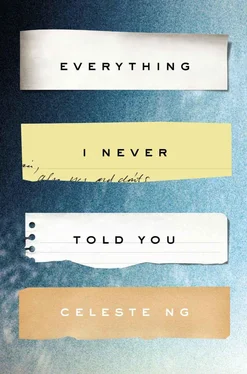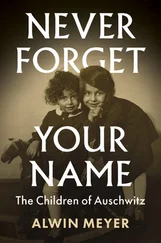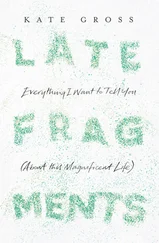“Marilyn,” James whispered when the doctor had gone. His tone made her name a question that she could not yet bring herself to answer. “We’ve missed you so much.”
Marilyn touched her unwounded hand to her belly for a long time. She could not take classes pregnant. She could not start medical school. All she could do was go home. And once she was home, she would see her children’s faces, and there would be a new baby, and — she admitted it to herself slowly, with an ache more painful than her hand — she would never have the strength to leave them again. There was James, kneeling on the floor beside her chair as if in prayer. There was her old life, soft and warm and smothering, pulling her into its lap. Nine weeks. Her grand plan had lasted nine weeks. Everything she had dreamed for herself faded away, like fine mist on a breeze. She could not remember now why she thought it had all been possible.
This is it, Marilyn told herself. Let it go. This is what you have. Accept it.
“I was so foolish,” she said. “I made such a terrible mistake.” She leaned into James, breathing in the heavy sweet smell of his neck. It smelled like home. “Forgive me,” she whispered.
James guided Marilyn to the car — his car — with his arm around her waist and helped her into the front seat as if she were a child. The next day, he would take a taxi from Middlewood back to Toledo and make the hour-long drive again in Marilyn’s car, warm and aglow at knowing his wife would be there when he got home. For now, though, he drove carefully, scrupulously obeying the speed limit, reaching over every few miles to pat Marilyn’s knee, as if reassuring himself that she was still there. “Are you too cold? Are you too warm? Are you thirsty?” he asked again and again. I’m not an invalid, Marilyn wanted to say, but her mind and tongue seemed to move in slow motion: they were already home, he had already gone to get her a cold drink and a pillow for the small of her back. He was so happy, she thought; look at that little bounce at the end of each step, look at how he tucked the blanket so carefully around her feet. When he came back, she said only, “Where are the children?” and James said he had left them across the street with Vivian Allen, not to worry, he would take care of everything.
Marilyn leaned back against the couch cushions and woke to the sound of the doorbell. It was almost dinnertime; James had retrieved the children from Mrs. Allen’s and a pizza deliveryman stood at the door with a stack of boxes. By the time Marilyn wiped the sleep from her eyes, James had already counted out the tip and taken the boxes and shut the door. She followed him, dozily, into the kitchen, where he put the pizza down right in the center of the table, between Lydia and Nath.
“Your mother’s home,” he said, as if they couldn’t see her standing there in the doorway behind him. Marilyn touched a hand to her hair and felt frizz. Her braid had come undone; her feet were bare; the kitchen was overly warm, overly bright. She felt like a child who’d overslept, wandering downstairs, late to everything. Lydia and Nath stared at her warily across the table, as if she might suddenly do something unexpected, like scream, or explode. Nath’s mouth puckered, as if he were sucking something sour, and Marilyn wanted to stroke his hair and tell him that she hadn’t planned any of this, hadn’t meant for this to happen. She could see the question in their eyes.
“I’m home,” she repeated, nodding, and they ran to hug her then, warm and solid, slamming into her legs, burying their faces in her skirt. One tear trickled down Nath’s cheek, one ran along Lydia’s nose, catching in her lips. Marilyn’s hand burned and throbbed, as if she were holding a hot little heart in her palm.
“Were you good while I was away?” she asked, crouching on the linoleum beside them. “Did you behave?”
To Lydia, her mother’s return was nothing short of a miracle. She had made a promise and her mother had heard it and come home. She would keep her word. That afternoon, when her father had hung up the phone and said those astonishing words— Your mother is coming home— she had made a decision: her mother would never have to see that sad cookbook again. At Mrs. Allen’s, she had made a plan, and after her father had picked them up— Shh, not a peep, your mother is sleeping— she had taken it away. “Mama,” she said into her mother’s hip now. “While you were gone. Your cookbook.” She swallowed. “I — lost it.”
“You did?” To her astonishment, Marilyn felt no anger. No: she felt pride. She pictured her daughter tossing the cookbook onto the grass and stomping it into the mud with her shiny Mary Janes and walking away. Tossing it into the lake. Setting it ablaze. To her own surprise, she smiled. “Did you do that,” she said, curling her arm around her small daughter, and Lydia hesitated, then nodded.
It was a sign, Marilyn decided. For her it was too late. But it wasn’t too late for Lydia. Marilyn would not be like her own mother, shunting her daughter toward husband and house, a life spent safely behind a deadbolt. She would help Lydia do everything she was capable of. She would spend the rest of her years guiding Lydia, sheltering her, the way you tended a prize rose: helping it grow, propping it with stakes, arching each stem toward perfection. In Marilyn’s belly, Hannah began to fidget and kick, but her mother could not yet feel it. She buried her nose in Lydia’s hair and made silent promises. Never to tell her to sit up straight, to find a husband, to keep a house. Never to suggest that there were jobs or lives or worlds not meant for her; never to let her hear doctor and think only man. To encourage her, for the rest of her life, to do more than her mother had.
“All right,” she said, releasing her daughter at last. “Who’s hungry?”
James was already taking plates from the cupboard, distributing napkins, lifting the lid of the top box in a whiff of meat-scented steam. Marilyn put a slice of pepperoni pizza on each of their plates, and Nath, with a deep, contented sigh, began to eat. His mother was home, and tomorrow there would be hard-boiled eggs for breakfast, hamburgers and hot dogs for supper, strawberry shortcake for dessert. Across the table, Lydia stared down at her portion in silence, at the red circles dotting the surface, at the long thin threads of cheese tying it back to the box.
Nath was only half-right: the next day there were hot dogs and hamburgers, but no eggs, no shortcake. James grilled the meat himself, charring it slightly, but the family, determined to celebrate, ate it anyway. In fact, Marilyn would refuse to cook at all after her return, each morning popping frozen waffles into the toaster, each evening heating a frozen potpie or opening a can of SpaghettiOs. She had other things on her mind. Math, she thought that Fourth of July; she will need math, this daughter of mine. “How many buns inside the bag?” she asked, and Lydia tapped each with her finger, counting up. “How many hot dogs are on the grill? How many won’t have buns?” At each right answer, her mother smoothed her hair and cuddled her against her thigh.
All day Lydia added up. If everybody ate one hot dog, how many would be left over for tomorrow? If she and Nath got five sparklers each, how many would they have all together? By the time dark fell and fireworks blossomed in the sky, she counted ten kisses from her mother, five caresses, three times her mother called her my smart girl. Every time she answered a question, a dimple appeared in her mother’s cheek like a little fingerprint. “Another,” she begged, every time her mother stopped. “Mama, ask me another.” “If that’s really what you want,” her mother said, and Lydia nodded. “Tomorrow,” Marilyn said, “I’ll buy you a book and we’ll read it together.”
Читать дальше












